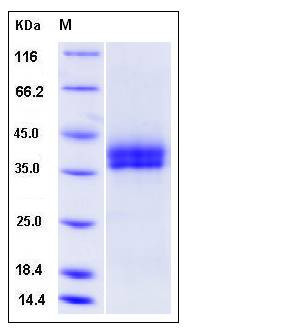Mouse KLK11 / Kallikrein-11 Protein (His Tag)
2310015I08Rik,Prss20,TLSP
- 100ug (NPP2737) Please inquiry
| Catalog Number | P50919-M08H |
|---|---|
| Organism Species | Mouse |
| Host | Human Cells |
| Synonyms | 2310015I08Rik,Prss20,TLSP |
| Molecular Weight | The secreted recombinant mouse KLK11 (pro form) comprises 243 amino acids and has a calculated molecular mass of 27.3 kDa. The apparent molecular mass of rmKLK11 is approximately 38-42 kDa in SDS-PAGE under reducing conditions. |
| predicted N | Glu 45 |
| SDS-PAGE |  |
| Purity | > 95 % as determined by SDS-PAGE |
| Protein Construction | A DNA sequence encoding the mouse KLK11 isoform 2 (Q9QYN3) (Met 1-Asn 276), was fused with a C-terminal polyhistidine tag. |
| Bio-activity | |
| Research Area | Cancer |Invasion microenvironment |Adhesion molecule |Extracelluar matrix |Extracellualr matrix proteases & regulators |Kallikrein / kinin | |
| Formulation | Lyophilized from sterile PBS, pH 7.4 1. Normally 5 % - 8 % trehalose and mannitol are added as protectants before lyophilization. Specific concentrations are included in the hardcopy of COA. |
| Background | kallikrein-related peptidase 11 (KLK11), also known as hippostasin, trypsin-like serine protease and PRSS20, is a member of human tissue kallikrein family. It is a subgroup of serine proteases with diverse physiological functions, which is implicated in carcinogenesis and some with potential that serving as novel biomarkers for ovarian and prostate cancer and other diseases. The KLK11 gene is one of the fifteen kallikrein subfamily members located in a cluster on chromosome 19. Two alternatively spliced forms exist, resulting in 250 (isoform 1) and 282 (isoform 2) amino acid sequences. Isoform 2 is identical to isoform 1, except for an inserted 32 amino acid segment. Isoform 1 is predominantly expressed in brain whereas isoform 2 is preferentially expressed in prostate. |
| Reference |
